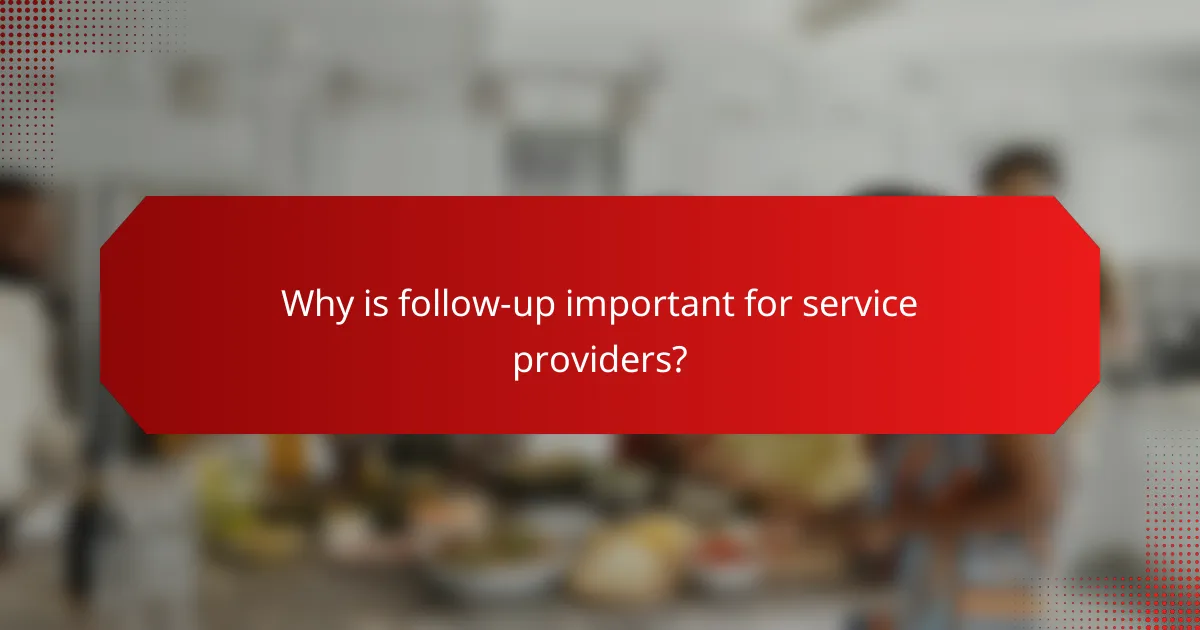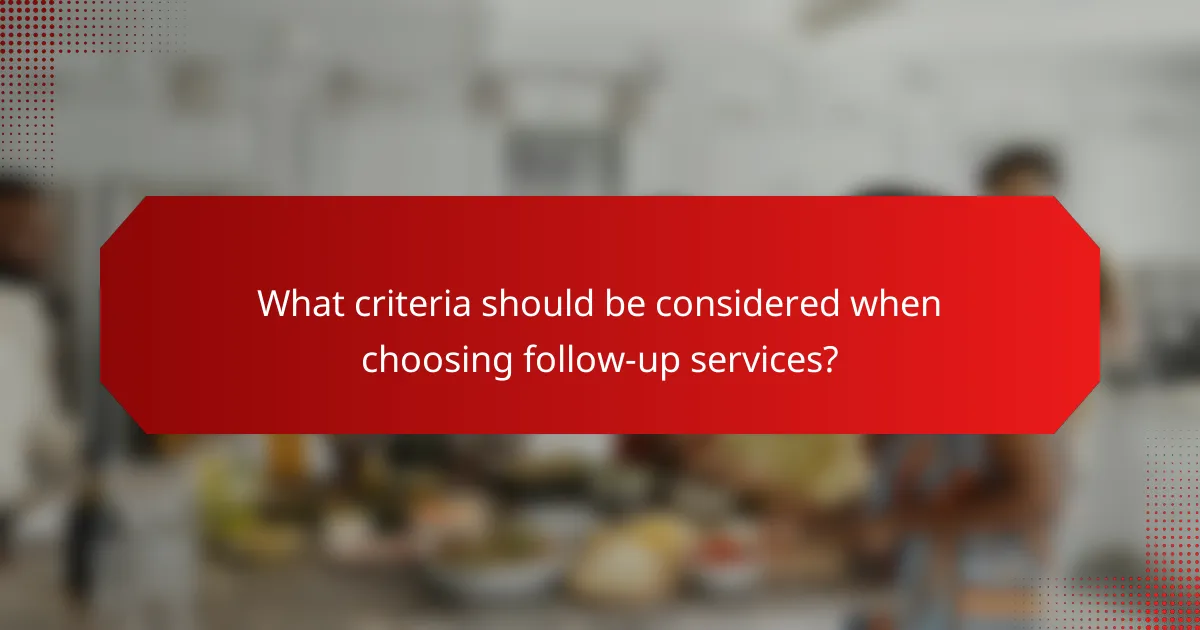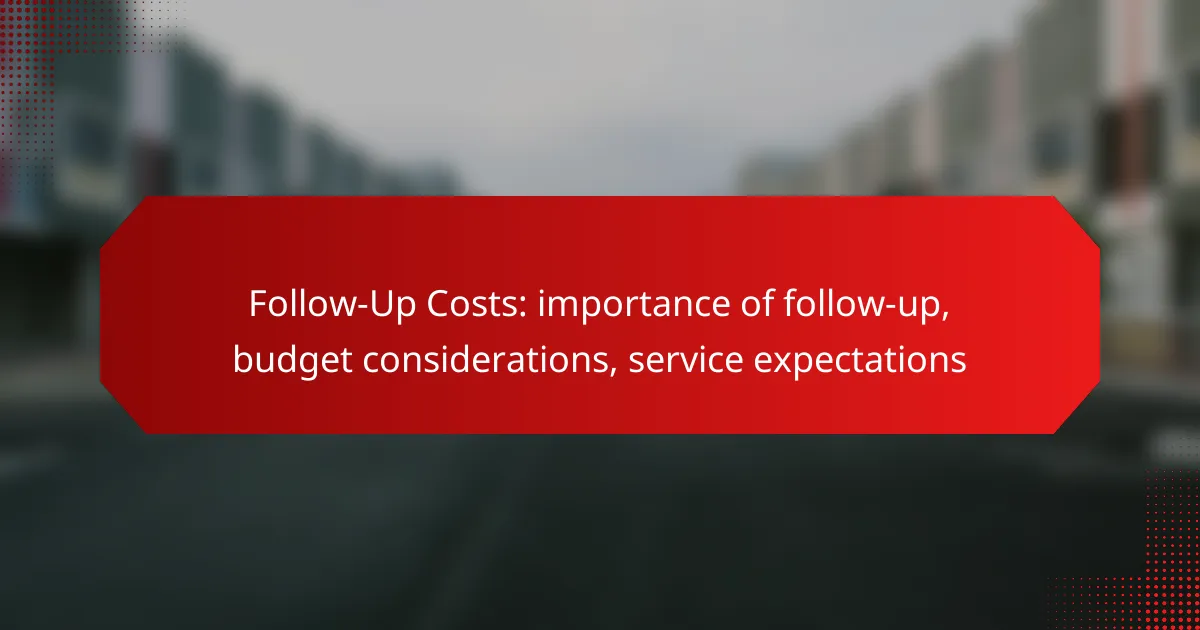Follow-up services play a vital role in maintaining client relationships and ensuring their ongoing needs are met after the initial engagement. Understanding the associated costs is crucial for service providers, as these can vary significantly based on the type of service and client requirements. Proper budgeting for follow-up expenses not only helps manage financial resources effectively but also supports the delivery of high-quality service and fosters customer loyalty.

What are the costs associated with follow-up services in the UK?
Follow-up services in the UK can incur various costs depending on the type of service and the specific needs of the client. These expenses can range from nominal fees for basic consultations to more substantial charges for comprehensive assessments or treatments.
Average follow-up service costs
The average costs for follow-up services in the UK can vary widely. For instance, a simple follow-up appointment with a general practitioner might cost around £30 to £60, while specialized consultations can range from £100 to £250 or more. It’s essential to check with individual providers for their specific pricing structures.
Many healthcare providers offer packages that include follow-up services, which can provide better value. These packages often bundle multiple visits or services at a reduced rate compared to paying for each session individually.
Factors influencing follow-up costs
Additionally, the complexity of the case can affect pricing. More complex medical conditions or treatments that require extensive monitoring will likely incur higher follow-up costs compared to straightforward cases.
Cost variations by service type
Different types of follow-up services can have significantly different costs. For example, follow-up care for chronic conditions, such as diabetes management, may involve regular consultations and tests, leading to higher cumulative costs over time. In contrast, follow-ups for minor procedures might only require a single visit.
It’s also important to consider whether the follow-up service is covered by insurance. Many health insurance plans in the UK may cover part or all of the costs for follow-up appointments, which can greatly reduce out-of-pocket expenses for patients.

Why is follow-up important for service providers?
Follow-up is crucial for service providers as it fosters ongoing relationships with clients and ensures that their needs are met after the initial service. Effective follow-up can lead to improved service quality and customer loyalty, which are essential for long-term success.
Enhances customer satisfaction
Follow-up directly enhances customer satisfaction by demonstrating that providers care about their clients’ experiences. Regular check-ins can help identify any issues early, allowing for timely resolutions and adjustments to services as needed.
For example, a service provider might follow up a week after a project completion to gather feedback. This proactive approach not only reassures clients but also shows commitment to quality service.
Increases retention rates
Consistent follow-up can significantly increase retention rates by keeping the lines of communication open. When clients feel valued and heard, they are more likely to continue using a provider’s services rather than switching to competitors.
Providers should consider scheduling follow-ups at regular intervals, such as quarterly or bi-annually, to maintain engagement. This strategy can lead to a loyal customer base that returns for future services.
Boosts referrals and recommendations
Effective follow-up can lead to more referrals and recommendations, as satisfied customers are likely to share their positive experiences with others. A simple follow-up call or email can prompt clients to refer friends or family, expanding the provider’s reach.
To maximize referrals, service providers can encourage satisfied clients to leave reviews or testimonials after follow-up interactions. Offering incentives for referrals can also motivate clients to spread the word about their positive experiences.

How to budget for follow-up services?
Budgeting for follow-up services is essential to ensure that you can effectively manage ongoing costs while meeting service expectations. This involves estimating expenses, allocating resources wisely, and tracking costs to avoid overspending.
Setting a follow-up budget
To set a follow-up budget, start by identifying the types of services you will need after the initial engagement. Consider factors such as frequency of follow-ups, the complexity of services, and any additional resources required. A practical approach is to allocate a percentage of your overall budget, typically between 10-20%, specifically for follow-up services.
For example, if your total budget is $10,000, you might set aside $1,000 to $2,000 for follow-ups. This ensures you have enough funds to cover necessary services without compromising your overall financial plan.
Allocating resources effectively
Effective resource allocation involves distributing your budget across different follow-up services based on their priority and expected impact. Consider which services are critical for maintaining client relationships and which may be less essential. Prioritize high-impact follow-ups, such as personalized communications or specialized support, over routine check-ins.
Utilizing tools like spreadsheets or budgeting software can help you visualize your allocations and make adjustments as needed. Regularly review your resource distribution to ensure it aligns with your evolving needs and goals.
Tracking follow-up expenses
Tracking follow-up expenses is crucial for staying within your budget and understanding where your money is going. Use accounting software or simple spreadsheets to record all follow-up-related costs, including personnel time, materials, and any third-party services.
Set up a monthly review process to analyze your spending against your budget. This will help you identify any areas where you may be overspending and allow you to make informed decisions about future allocations. Aim to keep your follow-up expenses within the budgeted range to maintain financial health.

What are the expected outcomes of follow-up services?
Follow-up services are essential for ensuring customer satisfaction and fostering long-term relationships. They can lead to increased loyalty, higher conversion rates, and a stronger brand reputation.
Improved customer loyalty
Effective follow-up services can significantly enhance customer loyalty. When customers feel valued through timely communication and support, they are more likely to return for future purchases.
Consider implementing a system for regular check-ins or feedback requests after a sale. This can be as simple as sending a thank-you email or a satisfaction survey, which can help reinforce the relationship.
Higher conversion rates
Follow-up services can lead to higher conversion rates by nurturing leads and guiding them through the sales funnel. Engaging with potential customers after their initial contact can address their concerns and encourage them to make a purchase.
For example, sending personalized follow-up emails with product recommendations or special offers can effectively convert hesitant prospects into buyers. Aim for a follow-up within a few days of their initial inquiry to keep your brand top-of-mind.
Enhanced brand reputation
Consistent follow-up services contribute to an enhanced brand reputation. When customers receive prompt and helpful responses, they are more likely to share positive experiences with others, boosting your brand’s image.
To maintain a strong reputation, ensure your follow-up services are professional and empathetic. Monitor feedback and address any negative experiences quickly to demonstrate your commitment to customer satisfaction.

What criteria should be considered when choosing follow-up services?
When selecting follow-up services, it’s essential to evaluate the service provider’s reputation, cost-effectiveness, and the specific needs of your situation. These criteria will help ensure that you receive quality care while managing your budget effectively.
Service provider reputation
The reputation of a service provider can significantly impact the quality of follow-up care you receive. Look for providers with positive reviews, testimonials, and a history of successful outcomes. Checking online ratings and asking for recommendations from trusted sources can help you gauge their reliability.
Additionally, consider whether the provider is accredited by relevant professional bodies. Accreditation often indicates adherence to industry standards and best practices, which can enhance your confidence in their services.
Cost-effectiveness
Cost-effectiveness is a critical factor when choosing follow-up services. Assess the pricing structure of different providers and compare what is included in their services. Some may offer packages that cover multiple follow-up visits or additional resources, which can provide better value.
Be mindful of hidden costs, such as administrative fees or charges for additional services. It’s wise to ask for a detailed breakdown of costs upfront to avoid surprises later. Consider your budget and prioritize services that offer the best balance between quality and affordability.
